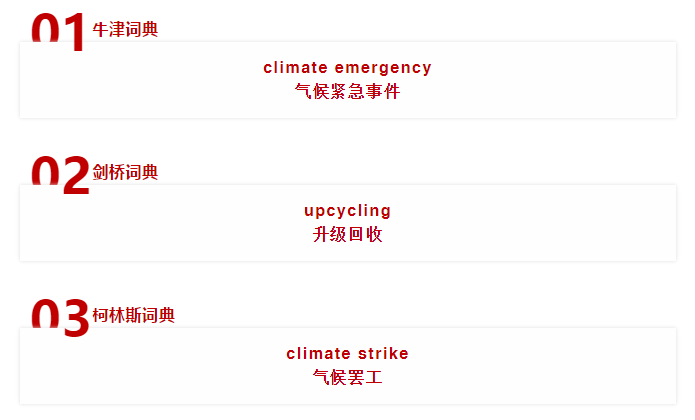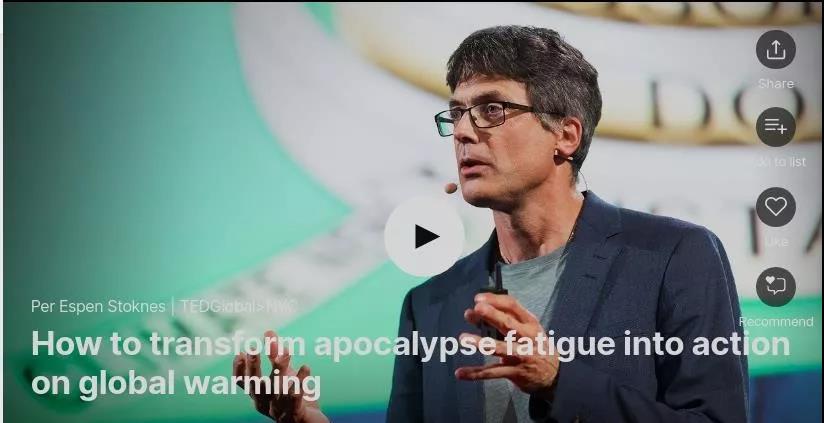近日,澳大利亚东南部林火持续肆虐,烧毁了考拉80%自然栖息地,上千只考拉死亡。加上被烧森林恢复难度大、气候变化和疾病威胁等,澳洲考拉正面临功能性灭绝的消息牵动人心。

来源:央视新闻
据悉,一旦种群数量减少到某个临界值一下,考拉就不能再繁衍下一代,进而可能导致灭绝。
同时,随着三大权威英语词典年度热词的公布,人们发现“环保”成为了2019年绕不开的热议话题。

这些热词的选择在一定程度上反映了人们对气候危机意识的增强,以及对环境破坏的反思和补救措施的采取。
环保从来不是新潮流,然而一直以来人们对此只是纸上谈兵。那么,到底是什么原因阻止了我们在意识到事态严重却仍然置之不理?我们又如何才能冲破这重重的心理束缚?
心理学家、经济学家埃斯彭•斯托克内斯(Per Espen Stoknes)围绕人类与自然之间的关系,对气候行为心理学进行了详细研究,并不断探索如何能将5种心理防御(five D's kill engagement)转变为成功的关键要素。
随着全球气候异常, 人们想要反转全球气候变暖局面,需要摒弃陈旧的灾难论。为人之本,首先是要认识到,身处自然之中,我们只是一介依靠新鲜空气生存的无名之辈。
下面就要我们一起看看到底有哪5种心理防御阻止了你力不从的环保心吧!(视频版请戳文末【阅读原文】)

How do we get people engaged in solving global warming?
我们如何才能让人们参与解决全球变暖问题?
I'd like to start with running two short experiments with you all. So your task is to notice if you feel any difference as I speak. OK? Here we go.
我想与你们一起,以两个简短的实验作为开场。你们的任务就是察觉自己是否有不同的感受。好吗?我们开始吧。
We are seeing rising carbon dioxide levels, now about 410 ppms. To avoid the RCP 8.5 scenario, we need rapid decarbonization. The global carbon budget for 66 percent likelihood to meet the two-degree target is approximately 800 gigatons.
我们见证着二氧化碳含量不断升高,现在浓度是0.41‰ 。为了避免出现典型浓度路径8.5的情景,我们需要快速脱碳。为了能有66%的可能性能够达到全球升温低于2摄氏度的目标, 全球碳预算大约是8000亿吨。
OK, now let me try something else.
好吧,我试着从另一个角度说明。
We are heading for an uninhabitable earth: monster storms, killer floods, devastating wildfires, crazy heat waves that will cook us under a blazing sun. 2017 is already so unexpectedly warm, it's freaking out climate scientists. We have a three-year window to cut emissions, three years. If not, we will soon live in a boiling earth, a hellhole. OK. So --
我们正朝着一个不宜居住的地球发展:猛烈的风暴、泛滥的洪水、毁灭性的野火、烈日下炙烤着我们的汹涌热浪。2017年已是如此出乎意料地温暖,使气候学家崩溃。我们有三年的时间减排,三年。如果不这么做的话,我们很快将置身于 一个酷热的地球,如同一个地狱。好吧。那么——
Now your task: How did these ways of speaking make you feel? The first, detached maybe or just confused? What's this guy talking about? The other, fearful or just numb? So again, the question I asked: How do we get people engaged in solving global warming? And why don't these two ways of communicating work?
现在你们的任务是:对于这些说法你们有什么感受?第一种,冷漠或许只是困惑?这个人在说什么?另一种,感到害怕或者只是麻木?所以,重申刚才我的问题:怎样才能让人们参与解决全球气候变暖问题?以及,为什么这两种传播方法不起作用?
You see, the biggest obstacle to dealing with climate disruptions lies between your ears. Building on a rapidly growing body of psychology and social science, I spent years looking into the five inner defenses that stop people from engaging.
你们会发现,应对气候破坏最大的障碍在于你们的耳朵。基于心理学和社会科学的快速发展,我用了多年时间研究5种阻止人们参与解决全球变暖问题的心理防御。
![]()
When people hear news about the climate coming straight at them, the first defense comes up rapidly: distance. When we hear about the climate, we hear about something far away in space -- think Arctic ice, polar bears -- far away in time -- think 2100. It's huge and slow-moving -- think gigatons and centuries. So it's not here. It's not now. Since it feels so far away from me, it seems outside my circle of influence, so I feel helpless about it. There's nothing I can do. In our everyday lives, most of us prefer to think about nearer things, such as our jobs, our kids, how many likes we get on Facebook. Now, that, that's real.
当人们听到与他们直接相关的气候新闻时,他们快速建立起第一种防御:距离。当我们听到有关气候的信息,我们听到了有关遥远太空的信息—— 想到北极冰、北极熊—— 遥远的时间——想到2100年。这是个庞大又缓慢的变化—— 几十亿吨和几个世纪。所以,我们现在体会不到。因为感觉到气候问题离自己很远,似乎不会影响到自己,所以觉得自己帮不上什么忙。我什么忙也帮不上。在我们的日常生活中,大多数人更倾向于考虑身边的事情,比如我们的工作、我们的孩子,我们在脸书上有多少个赞。这是事实。
![]()
Next defense is doom. Climate change is usually framed as a looming disaster, bringing losses, cost and sacrifice. That makes us fearful. But after the first fear is gone, my brain soon wants to avoid this topic altogether. After 30 years of scary climate change communications, more than 80 percent of media articles still use disaster framings, but people habituate to and then -- desensitize to doom overuse. So many of us are now suffering a kind of apocalypse fatigue, getting numb from too much collapse porn.
第二种防御:灾难。气候变化通常被视为一个正在逼近的灾难,带来各种伤亡、损失和牺牲。让我们感到恐惧。但是当第一层恐惧褪去,我的大脑很快地想要彻底摆脱这个话题。在经历了30年可怕的关于气候变化的话题之后,超过80%的媒体文章依旧使用灾难这个定义,但是人们已经习惯了,以至于—— 对这种频繁的报道变得麻木。我们中的许多人对这种灾难论产生厌倦,太多的灾难论让人变得麻木。
![]()
The third defense is dissonance. Now, if what we know, that fossil fuel use contributes to global warming, conflicts with what we do -- drive, fly, eat beef -- then so-called cognitive dissonance sets in. This is felt as an inner discomfort. We may feel like hypocrites. To get rid of this discomfort, our brain starts coming up with justifications. So I can say, for instance, "My neighbor, he has a much bigger car than I do." Or, "Changing my diet doesn't amount to anything if I am the only one to do it." Or, I could even want to doubt climate science itself. I could say, "You know, climate is always changing."
第三种防御:失调。现在,如果我们所知道的,使用化石燃料会导致全球气候变暖,与我们所做的互相矛盾—— 开车、坐飞机、吃牛肉—— 那么这就是所谓的认知失调。这是一种内在的不安。我们可能会有一种伪善的感觉,为了摆脱这种不安,我们的大脑开始寻找一些理由。举个例子,所以我会说:“我邻居的车比我的要大很多。” 或者,“如果只有我一个人改变饮食习惯,这根本起不了任何作用。” 又或者,我甚至可以怀疑气候科学本身。我可以说:“你知道的,气候总是在变化。”
So these justifications make us all feel better, but at the expense of dismissing what we know. Thus, behavior drives attitudes. My personal cognitive dissonance comes up when I recognize that I've been flying from Oslo to New York and back to Oslo in order to speak about the climate.
所以这些理由让我们都好受一些,但代价却是 我们对于自己所了解的事实置之不理。因此,行为引导态度。当我意识到我为了讨论气候问题从奥斯陆坐飞机来到纽约然后再飞回奥斯陆我个人的认知失调产生了。
![]()
So that makes me want to move on to denial.
所以这使我想要继续讨论下一个防御:拒绝承认。
So if we keep silent, ignore or ridicule facts about climate disruptions, then we might find inner refuge from fear and guilt. Denial doesn't really come from lack of intelligence or knowledge. No, denial is a state of mind in which I may be aware of some troubling knowledge, but I live and act as if I don't know. So you could call it a kind of double life, both knowing and not knowing, and often this is reinforced by others, my family or community, agreeing not to raise this tricky topic.
所以,如果我们保持沉默,忽视或是嘲笑气候破坏这个事实,那么我们可能会发现我们是在逃避内心的恐惧和罪恶。拒绝承认并不是因为缺少智慧或是知识。而是因为,拒绝承认是一种心理状态。在这种心理状态下,我可能意识到了一些麻烦,但我表现得如同我并不知道这些麻烦一样。所以你可以称之为一种双重生活,可以说是知道的,又表现得不知道,而且这种心理又通过我的家人和我所在的社区得到加强,他们赞同不再提起这个难以应对的话题。
![]()
Finally, identity. Alarmed climate activists demand that government takes action, either with regulation or carbon taxes. But consider what happens when people who hold conservative values, for instance, hear from an activist that government ought to expand even further. Particularly in rich Western democracies, they are then less likely to believe that science. How is that? Well, if I hold conservative values, for instance, I probably prefer big proper cars and small government over tiny, tiny cars and huge government. And if climate science comes and then says government should expand further, then I probably will trust that science less. In this way, cultural identity starts to override the facts. The values eat the facts, and my identity trumps truth any day.
最后一种防御:认同。焦虑的气候活动家要求政府采取行动,要么制定规章,要么征收碳排放税。但是设想一下,会有什么事情发生,当那些保守派的人从一个活动家那里听说 政府应该大力扩展。尤其是在一些富有的西方民主国家,他们更可能不太相信这种理论。为什么会这样?比如说我是个观念保守的人,比起小型汽车和大型政府,我更倾向于大型汽车和小型政府。如果气候科学表明政府应该大力扩展,那么我可能就不会那么相信这个说法。文化认同以这种方式凌驾于事实之上。观念打败了事实,无论如何,我的认同战胜了真相。
So, after recognizing how these five D's kill engagement, how can we move beyond them? New research shows how we can flip these five defenses over into key success criteria for a more brain-friendly climate communication. So this is where it gets really exciting and where we find the five S's, the five evidence-based solutions for what does work.
所以,了解了这5种防御是如何阻止我们参与解决问题之后, 我们怎样才能冲破它们? 新的研究告诉我们如何把这5种防御转变为成功的关键标准,使得气候传播更能令人接受。所以这就是它令人感到激动之处,以及使我们找到5种解决办法,5种基于证据的、可行的解决办法。
![]()
First, we can flip distance to social. We can make climate feel near, personal and urgent by bringing it home, and we can do that by spreading social norms that are positive to solutions. If I believe my friends or neighbors, you guys, will do something, then I will, too. We can see, for instance, this from rooftop solar panels. They are spreading from neighbor to neighbor like a virus. It's contagious. This is the power of peer-to-peer creating the new normal.
首先,我们可以将距离转变为邻里。通过把气候问题带回家,传播有利于解决问题的社会规范,我们可以使气候问题转变为身边的、个人的、急切的问题。如果我相信我的朋友们或是邻居们、你们将会采取行动,那么,我也会那么做。我们可以见证这一点,举例而言,屋顶上的太阳能板。它们像病毒一样,挨家挨户传播。它是具有感染力的。这种点对点的力量创造了一种新的态势。
![]()
Next, we can flip doom to supportive. Rather than backfiring frames such as disaster and cost, we can reframe climate as being really about human health, for instance, with plant-based delicious burgers, good for you and good for the climate. We can also reframe climate as being about new tech opportunities, about safety and about new jobs. Solar jobs, for instance, are seeing an amazing growth. They just passed the three million jobs mark. Psychology says, in order to create engagement, we should present, on balance, three positive or supportive framings for each climate threat we mention.
其次,我们可以把灾难转变为支持。与其采用灾难、损失等 事与愿违的定义,我们不如重新定义气候,它是与人类健康息息相关的,比如,一个美味的蔬菜汉堡包,既有利于你的健康,又对气候做贡献。我们还可以重新定义气候,将它与新技术机会联系在一起,有关于安全以及新工作的新技术机会。举例而言,有关太阳能的工作正在惊人地增长。它们超越了300万个工作的记录。心理学表明,为了使人们参与解决全球气候变暖问题,总的来说,针对我们所提出的每一个气候威胁,我们应该列出3个积极的或是支持性的定义。
![]()
Then we can flip dissonance to simpler actions. This is often called nudging. The idea is, by better choice architecture, we can make the climate-friendly behaviors default and convenient. Let me illustrate this. Take food waste. Food waste at buffets goes way down if the plate or the box size is reduced a little, because on the smaller plate it looks full but in the big box it looks half empty, so we put more in. So smaller plates make a big difference for food waste. And there are hundreds of smart nudges like this.
接着,我们可以将失调转变为更简单的行动。这通常被称为助推。也就是说,通过更好的选择架构,我们可以更加方便地做出有利于改善气候的行为。听我来解释。比如说浪费食物这一点。如果餐盘或是餐盒形状变得小一点,那么宴会上食物浪费就会少一些,因为装在小一些的盘子上,看起来更满 而装在大餐盘里,看起来还有一半是空的,所以我们就往里面装更多。因此,将餐盘变小对于 食物浪费有着大作用。而且还有许多诸如此类的机智的助推。
![]()
The point is, dissonance goes down as more behaviors are nudged. Then we can flip denial by tailoring signals that visualize our progress. We can provide motivating feedback on how well we're doing with our problem-solving. Say you improved your transport footprint or cut energy waste in your buildings. Then one app that can share this well is called Ducky. The idea is, you log your actions there, and then you can see how well your team or company is doing, so you get real-time signals.
重点在于,随着更多的行为得到助推,失调也就逐渐减少。之后,我们可以通过调整信号可视化我们所做的一切,转变拒绝承认。根据我们为了解决问题所做的努力,我们可以提供积极的反馈。例如你改善了你的交通足迹或是减少了你所在建筑的能源浪费。那么,你可以在一个名为“Ducky”的手机应用上分享你的行为。它的理念是,你在它上面记录自己的行为,就可以看到你的团队或者公司的表现,所以你会得到实时信号。
![]()
Finally, identity. We can flip identity with better stories. Our brain loves stories. So we need better stories of where we all want to go, and we need more stories of the heroes and heroines of all stripes that are making real change happen.
最后一点,认同。我们可以利用美好的故事克服认同。 我们的大脑喜欢故事。所以我们需要更美好的、更多的故事, 有关我们共同前进方向的故事, 有关各种带来真正改变的英雄的故事。
I'm proud that my hometown of Oslo is now embarking on a bold journey of electrifying all transport, whether cars, bikes or buses. One of the people spearheading this is Christina Bu. She is heading the Electric Vehicle Association for years and she has been fighting every day. Now, the UK and France, India and China have also announced plans for ending the sales of fossil cars. Now, that's massive. And in Oslo, we can see how enthusiastic EV owners go and tell their electric stories to friends and neighbors and bring them along. So we come full circle from story back to social.
我为我的家乡奥斯陆感到自豪,奥斯陆正在展开一项大胆的活动,使所有的交通工具电动化,无论是汽车、自行车或是公交车。克里斯蒂娜 ·布是这项活动的带头人之一。她掌管电动车协会多年 她每天都在努力。如今,英国、法国、印度以及中国都出台了相关计划停止销售使用化石燃料的汽车。现在,规模越来越大。在奥斯陆,我们可以看到电动汽车车主充满热情地向他们的朋友、邻居奔走相告他们的电动故事,也将他们的朋友、邻居带上电动化之路。所以我们绕了一个圈又从故事回到邻里。
So thousands of climate communicators are now starting to use these solutions all over the world. It is clear, however, that individual solutions are not sufficient to solving climate alone, but they do build stronger bottom-up support for policies and solutions that can. That is why engaging people is so crucial.
所以,现在数千名气候传播者在全世界 开始使用这些方法。我们明白光靠个人的力量去解决气候问题是远远不够的,但是他们确确实实为气候相关的政策制定和解决方法提供了自下而上的支持。可见人们的参与是多么重要。
I started this talk with testing two ways of communicating climate with you. There is another way, too, I'd like to share with you. It starts with reimagining climate itself as the living air.
在我开始演讲的时候,就两种气候传播方式与你们进行了实验。还有另一种方式,我愿与你们分享。把气候本身想象成 身边的空气。
Climate isn't really about some abstract, distant climate far, far away from us. It's about this air that surrounds us. This air, you can feel in this room, too, the air that moves right now in your nostrils. This air is our earth's skin. It's amazingly thin, compared to the size of the earth and the cosmos it shields us from, far thinner than the skin of an apple compared to its diameter. It may look infinite when we look up, but the beautiful, breathable air is only like five to seven miles thin, a fragile wrapping around a massive ball. Inside this skin, we're all closely connected. The breath that you just took contained around 400,000 of the same argon atoms that Gandhi breathed during his lifetime. Inside this thin, fluctuating, unsettled film, all of life is nourished, protected and held. It insulates and regulates temperatures in a range that is just right for water and for life as we know it, and mediating between the blue ocean and black eternity, the clouds carry all the billions of tons of water needed for the soils. The air fills the rivers, stirs the waters, waters the forests.
气候并不单纯是抽象的、遥远的存在,它并不是离我们非常遥远,它是环绕我们周围的空气。这空气,现在你也可以在这个演播厅里感受得到,这空气在你的鼻孔里流动。这空气是我们地球的皮肤。相比于地球的体积和在它的庇护下与我们隔离开的宇宙,它的厚度是如此的薄,远远比一个苹果表皮和果肉的直径之比要薄得多。当我们抬头仰望,它显得浩瀚无垠,但是这美丽的、可呼吸的空气只存在于距离地面15到17英里的范围内,薄薄的一层包裹着一个巨大的地球。在地球的这层皮肤里,我们紧密相联。你刚刚呼吸的那一口空气,含有大约40万个氩原子这也是甘地一生所呼吸的空气。在这层稀薄的、不断波动变化着 的空气里,所有的生命得到滋养、保护和支持。它隔绝和稳定温度,使之刚好维持在我们所了解的适合水和生命存在的范围之内,介于蓝色海洋和无垠宇宙之间。云承载着土壤所需的几十亿吨的水。空气造就了河流, 轻拂过海洋, 浇灌着森林。
With a global weirding of the weather, there are good reasons for feeling fear and despair, yet we may first grieve today's sorry state and losses and then turn to face the future with sober eyes and determination. The new psychology of climate action lies in letting go, not of science, but of the crutches of abstractions and doomism, and then choosing to tell the new stories. These are the stories of how we achieve drawdown, the reversing of global warming. These are the stories of the steps we take as peoples, cities, companies and public bodies in caring for the air in spite of strong headwinds. These are the stories of the steps we take because they ground us in what we are as humans: earthlings inside this living air.
由于全球气候异常, 我们当然会感到害怕和失望, 而我们可能首先会为今日的悲惨境地和损失感到悲伤,之后将以坚定的眼神和决心面对未来。新的气候行为心理学在于摒弃那些抽象的概念和灾难论,而非科学理论,并且选择去描绘新的故事。这些就是我们如何实现节能减排,反转全球气候变暖局面的故事。也是我们作为个人、城市、公司以及公共机构,如何一步步地顶着巨大阻力,关心空气的故事。这也是我们采取行动的故事。因为这是我们之所以为人的基本:靠着这层新鲜的空气生存的凡人。
Thank you.
谢谢。










